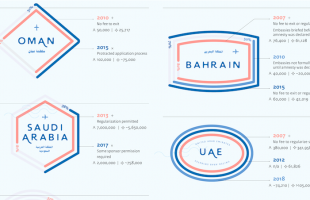Forbes.com has ranked the UAE as the least friendly country in the world for expat workers. Countries trailing closely behind include Saudi Arabia and Qatar.
The ranking was framed around the HSBC’s Expat Explorer Survey, which polls expats across 100 countries regarding their “ability to befriend locals, success in learning the language, integration into the community and ease of fitting into the local culture,” as well as personal economics, raising children, and overall experience.
Emirates and expatriates living in the UAE, shared their thoughts over the new label on twitter; critics and sympathizers alike used the hashtag #UAEFriendly to express their defense of the UAE, or of the article's findings. Given the relatively limited access to internet by the average migrant worker in labor or domestic fields, the overall response is likely dominated by mid-to-upper class white collar migrant workers.
The UAE’s The National ran a feature criticizing the article’s methods and conclusion, but the response again appeared to only address top-tier expats, rather than migrants from undeveloped countries - who aren’t afforded the protections and courtesies that come with high paying employment and reliable consulates.
While some of the ranking criteria have their weaknesses, the polling questions do pinpoint an important aspect of migrant wellbeing: the social integration or marginalization of non-citizens. Marginalization is the precursor and the enabler of iniquitous labor laws, including the disparate standards of employment safety, maximum working hours, and minimum wage for citizens and migrants (or in the case of domestic workers - hardly any standards at all). The 'unfriendly' designation, while subjective, is consistent with a recent study that found 25% of Emirati migrant workers are clinically depressed.
Read a lively discussion which includes commentary from migrants across the socio-economic spectrum here.




